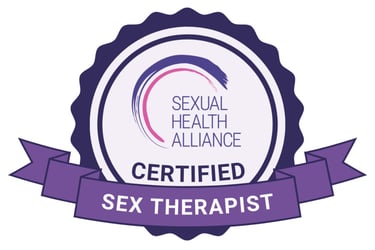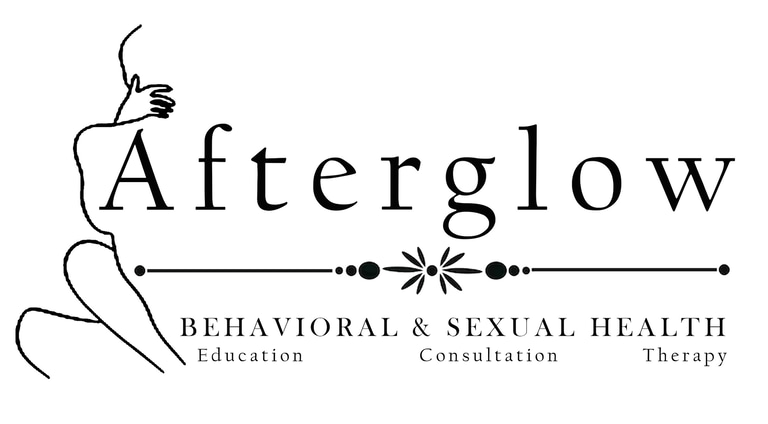Sexual Health Support for Military Veterans with Service-Connected Disabilities
Military service leaves lasting marks—some visible, others deeply internal. For many veterans, service-connected disabilities bring unexpected and challenging changes to their sexual health and intimate relationships. Whether you're dealing with physical injuries, chronic pain, PTSD, TBI, or emotional wounds that never quite healed, you deserve compassionate, informed support that honors your service and your humanity.
At Afterglow Behavioral and Sexual Health, we specialize in providing trauma-informed sexual health care for veterans navigating these complex intersections of body, identity, connection, and healing.


44%
20%
Or less report, discuss, or address the issue
Veterans experience sexual health concerns
Welcome to Afterglow — Where Your Story is Seen, and Your Healing is Honored
At Afterglow Behavioral and Sexual Health, we recognize that military service doesn’t end when the uniform comes off. For many veterans, service-connected disabilities leave lasting marks—on the body, the mind, and the way we experience intimacy.
Our founder, Dr. Kent, is a disabled veteran who understands these struggles not just clinically, but personally. He built Afterglow as a space where veterans could feel respected, understood, and fully supported in addressing the complex ways trauma, disability, and sexuality intersect. Having walked the road himself, Dr. Kent knows how deeply service can affect one’s sense of self—not only physically, but emotionally and sexually. He created Afterglow as a place where veterans can begin to rebuild their sense of wholeness, without judgment or shame.
Dr. Kent’s unique perspective as both a clinician and a fellow disabled veteran informs every aspect of our care. You won’t have to explain what it’s like to lose a part of your body or your sense of masculinity, femininity, or autonomy—he’s been there.
You’ve sacrificed. You’ve endured. And now, you deserve to experience intimacy, connection, and pleasure on your terms—with care that honors your journey. This is more than professional expertise. It’s lived understanding.
The Overlooked Wound: Sexual Health in the Veteran Community
Sexual health challenges are a pervasive yet frequently overlooked issue among veterans. A 2019 survey by the U.S. Department of Veterans Affairs found that approximately 50% of veterans reported some form of sexual dysfunction, including decreased desire, difficulties with arousal, or pain during sexual activity. Despite the high prevalence, only 18% of veterans said their healthcare providers ever addressed sexual health concerns during medical visits. Veterans with traumatic brain injury (TBI) and chronic pain conditions are especially at risk, with studies indicating that up to 75% of those with TBI experience sexual difficulties (Archives of Physical Medicine and Rehabilitation, 2018). This gap in care means many veterans endure significant emotional distress and relational strain without support, underscoring the need for routine sexual health screening and intervention within veteran healthcare systems.
Moreover, systemic barriers contribute to this silence around sexual wellness. Research published in Military Medicine (2021) found that only 12% of veterans felt comfortable discussing sexual issues with their providers, largely due to stigma and perceived provider discomfort. Additionally, the same study highlighted that sexual health concerns are often overshadowed by other pressing medical issues, leading to underdiagnosis and undertreatment. This neglect ignores the strong link between sexual health and psychological well-being; veterans reporting unresolved sexual problems have three times higher rates of depressive symptoms and anxiety disorders compared to those without sexual dysfunction. Addressing sexual health proactively through trauma-informed, veteran-centered care is critical for improving holistic recovery and quality of life for those who have served.
Sexual health challenges are a common but under-discussed consequence of service-connected conditions. Whether due to physical injuries, PTSD, traumatic brain injuries, chronic pain, medications, or emotional trauma, many veterans experience:
Reduced libido or arousal
Erectile dysfunction or changes in orgasmic response
Pain or discomfort during intimacy
Feelings of shame, anger, or detachment
Difficulty trusting or connecting with partners
A shift in self-identity and sexual confidence
These issues are real—and they are valid. At Afterglow, we treat sexual health as an essential component of overall wellbeing, not a luxury.
Restoring Intimacy on Your Terms
Restoring intimacy after military service is a vital part of long-term recovery and reintegration, yet it is often neglected in both clinical and relational settings. Research from the Department of Veterans Affairs has shown that sexual health and emotional closeness are significantly disrupted in veterans with service-connected disabilities, chronic pain, or post-traumatic stress disorder (PTSD). In fact, up to 80% of veterans with PTSD report difficulties with sexual desire, arousal, or maintaining relationships (The Journal of Sexual Medicine, 2015). These challenges not only affect physical intimacy but also create emotional distance and communication breakdowns in relationships. Veterans often internalize these changes as personal failures, unaware that the neurobiological impacts of trauma, medication side effects, and physical injuries are common—and treatable—factors contributing to sexual dysfunction.
Encouragingly, studies show that when intimacy is addressed openly and holistically, veterans experience measurable improvements in quality of life, relationship satisfaction, and emotional well-being. Couples-based interventions tailored to veteran populations—such as the VA’s Intimacy and Communication Skills workshops—have led to significant increases in relational closeness, sexual satisfaction, and mental health scores within 8 to 12 weeks. Moreover, therapeutic approaches that integrate body awareness, trauma-informed care, and sexual health education—such as those grounded in frameworks like Afterglow’s wabi-sabi body model—help veterans reclaim confidence and connection without pressure to return to a pre-service “normal.” When intimacy is reframed as a form of healing, not performance, veterans are more likely to engage, communicate, and rebuild meaningful closeness in their lives.
At Afterglow, we believe that intimacy is still possible—though it may take new forms and a different kind of trust. We help veterans and their partners navigate:
The emotional impact of body changes on sexual self-esteem
Communication strategies to rebuild connection
Adapted sexual positions or tools for accessibility and comfort
Trauma-informed approaches to pleasure and desire
Support for Military Sexual Trauma (MST) survivors
Relationship dynamics affected by caregiving roles or physical limitations
Sexuality does not end with disability. It evolves—and we’re here to walk beside you as it does.
Breaking the Silence, Easing the Shame
Many veterans carry silent burdens about changes in their sexual function, fearing they’re “broken,” “less of a man,” or “not desirable anymore.” These messages are harmful—and untrue.
For many veterans, changes in sexual function after military service become a deeply personal and rarely voiced burden. Research shows that nearly half (44%) of all veterans receiving VA care report sexual health concerns, such as diminished desire, erectile dysfunction, and difficulty with intimacy (VA Office of Research & Development, 2020). Despite this, less than 20% ever receive treatment or even speak to a provider about these issues. Reasons for this silence are complex—ranging from internalized stigma, fear of appearing weak, and cultural norms within military communities that discourage vulnerability. As a result, many veterans live with unresolved shame, frustration, and disconnection from partners, believing they must navigate these changes alone.
This unspoken struggle has far-reaching consequences. Studies have linked sexual dysfunction in veterans to increased rates of depression, relationship distress, and lower overall quality of life (The Journal of Sexual Medicine, 2015). Veterans with service-connected disabilities, chronic pain, or PTSD face particularly high risks, yet are often overlooked in sexual health assessments. Compounding the issue is the widespread avoidance of sexual health discussions by healthcare providers, with a 2018 study showing that only 14% of clinicians regularly ask veterans about sexual well-being (JAMA Internal Medicine). This silence perpetuates the idea that sexual health is a luxury, not a legitimate part of rehabilitation. Without open dialogue and specialized care, veterans are left carrying invisible wounds that affect their identity, connection, and emotional resilience.
At Afterglow, we reject the idea that pleasure, passion, or confidence must end with injury or trauma. Instead, we help you rewrite your story on your terms—with patience, compassion, and expert care.
You’ve carried enough. Let us help carry this part with you.

Get More Informatin or Schedule Today
Connect with us
© 2025. All rights reserved.
dr.kent.sexhealth@gmail.com


